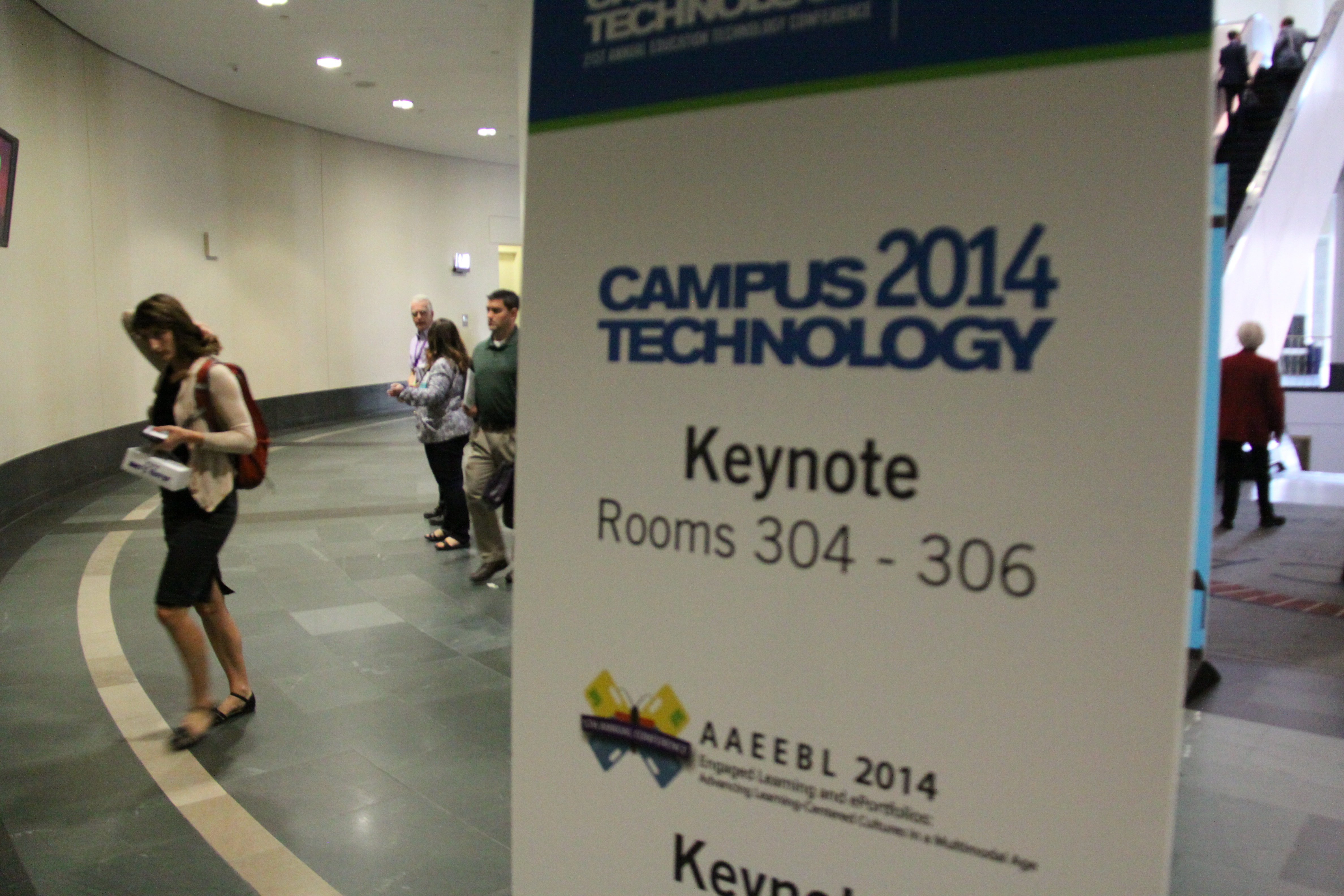
More than 150 young start-ups turned out for the 21st annual Campus Technology conference in Boston. (Kirk Carapezza/WGBH).
College administrators and IT geeks are descending on Boston this week to discuss how the expanding role of technology in education is changing teaching and learning on college campuses. The 21st annual Campus Technology conference opened on Tuesday at the Hynes Convention Center, giving young start-ups the chance to push products that could shape the next generation of high-tech in higher education.
______________________________________________________
In between sessions exploring what's new on the education technology horizon, faculty and IT staff walked the floor where more than 150 companies were hawking their software and gadgets. On display was everything from a virtual exam proctoring service to the latest in 3-D printing.
One start-up generating significant buzz was Fidelis Education, which is using social networking software to reduce attrition through online mentoring. Fidelis CEO founder Gunnar Counselman characterizes his product as a learning relationship management system.
"It's basically a way for schools and companies - any teaching and learning organization - to make sure that every single person has the assets they need to be successful," Counselman tells WGBH's On Campus.
The software program helps faculty and administrators monitor students' goals by tracking their coursework, extracurricular activities and mentorships.
"People are the most important but least talked about part of education," Counselman says. "Each student gets a coach through the platform and that coach then guides you along the total trajectory of your education to make sure you don't just graduate but you graduate ready for whatever the heck it is you are in school for to begin with."
At a time when many families want a return on their investment, Counselman says Fidelis is meeting a real demand in today's higher education marketplace. The start-up, which launched in December, has 15 customers so far, including Stanford, Arizona State, American Military University and Lipscomb University in Nashville.
Counselman says his product is geared toward college administrators who are struggling to maintain enrollment and produce graduates ready for the workforce. "There's a bottom-line element to it, but there's also a delivering-value-to-your-students element to it," Counselman says.
Fidelis also allows companies to recruit directly from college and universities. It uses digital badges that show what students know and know how to do. Counselman thinks a college degree is a massive credential that doesn't effectively tell employers what they need want to learn about potential candidates. "We've got a way for schools to issue badges and a way for students to be found by employers."
Micaheal Goay, executive director of information technology at the University of Southern California, was impressed by the technology.
"Part of the performance metrics we look at is how do we attract high quality students and help them in their careers," Goay says. "Building a relationship with students is critical. If you have a good relationship between the institution and the student, the student will feel that they are engaged."
While much of the technology at the conference focused on student experience and outcomes, other companies were making pitches to individual professors.
Andrew Colchagoff is the co-founder of Ginkgo Tree, a Detroit-based start-up hoping to change the face of textbooks and provide online alternatives.
The two-year-old company offers a content management system that allows educators to post published materials online or upload their own research to share in class.
"They can move it around and create their own custom curriculum for their students," Colchagoff explains. "It makes the distribution a lot easier. It becomes a matter of a click of a button to take that bundle and distribute it to their students year after year."
Faculty are able to make changes and upload lecture videos, coordinating online conversations. Colchagoff, 28, says Ginkgo's management system brings learning material into the twenty-first century. "The idea of heavy textbooks in a back pack is so retro at this point."
Ginkgo Tree is already partnering with McGraw-Hill, a publisher of higher education textbooks, and it expects to have its software on more than 25 college campuses this fall.
Other products on display promised campus cybersecurity and wearable technology, like smart watches and smart glasses. One of the most interesting apps, though, was a video game that, among other things, teaches medical school graduates how to talk about contraception.
On Wednesday morning, IT professionals gathered to listen to Anant Agarwal, CEO and president of Harvard and MIT's online learning platform, edX. Agarwal said online learning offers the opportunity to assess student work continuously.
"We know what they're doing at what time," Agarwal said.
The computer science professor also suggested MIT might soon offer course credit to students who earn an edX certificate if they are later admitted to the university.
The 2014 Campus Technology conference closes on Thursday. Find more information here.










